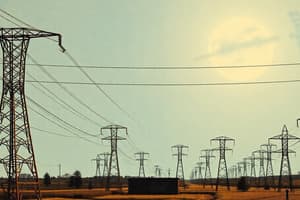Podcast
Questions and Answers
What is one of the main advantages of a transmission system?
What is one of the main advantages of a transmission system?
- High capital costs
- Increased household energy costs
- Better voltage stability (correct)
- Greater land use restrictions
What is a potential long-term impact of a transmission system?
What is a potential long-term impact of a transmission system?
- Reduced voltage drops
- Increased energy bills
- Better grid reliability
- Loss of woodland (correct)
Which of the following is considered a disadvantage of a transmission system?
Which of the following is considered a disadvantage of a transmission system?
- Low transmission losses
- Increased power transmission efficiency
- Reduced emissions
- Reliability concerns (correct)
How does operating at high voltages benefit a transmission system?
How does operating at high voltages benefit a transmission system?
Which of these factors is not an impact of transmission system construction?
Which of these factors is not an impact of transmission system construction?
What aspect does smart grid initiatives aim to improve within the transmission system?
What aspect does smart grid initiatives aim to improve within the transmission system?
Which of the following is a temporary impact of transmission system maintenance?
Which of the following is a temporary impact of transmission system maintenance?
What goal do technological advancements in transmission systems aim to achieve?
What goal do technological advancements in transmission systems aim to achieve?
What is the primary function of a transmission system?
What is the primary function of a transmission system?
Which of the following correctly describes an overhead transmission line?
Which of the following correctly describes an overhead transmission line?
What voltage range is typically associated with sub transmission lines?
What voltage range is typically associated with sub transmission lines?
How does an underground transmission line differ from overhead lines?
How does an underground transmission line differ from overhead lines?
Which statement is true regarding the history of transmission systems?
Which statement is true regarding the history of transmission systems?
What is the main purpose of sub transmission lines?
What is the main purpose of sub transmission lines?
Which of the following best describes the characteristics of overhead lines?
Which of the following best describes the characteristics of overhead lines?
What type of conductor is commonly found in overhead transmission lines?
What type of conductor is commonly found in overhead transmission lines?
Flashcards are hidden until you start studying
Study Notes
Transmission System Overview
- Infrastructure for transmitting electrical power from generation stations to substations and distribution networks.
- Comprises high-voltage power lines.
Types of Transmission Lines
- Overhead Transmission Lines: Structures for long-distance power transmission, consisting of suspended conductors supported by towers or poles.
- Sub Transmission Lines: Carry reduced voltage (typically 34.5 kV to 69 kV) from major transmission systems to regional distribution substations.
- Underground Transmission Lines: Electrical or telecommunications cables laid below ground, distinct from large natural gas pipelines.
Historical Context
- First industrial electricity transmission line operated in Italy (1882) between Tivoli and Rome at 5,100 Volts.
- Foundation of modern power transmission initiated by Thomas A. Edison’s Pearl Street Station in 1882, employing a DC generator and radial line system for lighting.
Benefits of Transmission Systems
- Reduces household energy costs and lowers energy bills.
- Enhances grid reliability and reduces emissions.
Impact of Transmission Systems
- Long-term impacts include land use restrictions, loss of woodland, and aesthetic concerns.
- Temporary impacts arise during construction or maintenance, causing noise and potential crop damage.
Advantages of Transmission Systems
- Low transmission losses and improved voltage stability.
- Cost reductions and increased power transmission efficiency through higher operating voltages.
Disadvantages of Transmission Systems
- Occurrence of transmission losses and voltage drops.
- High capital costs and concerns over reliability.
Summary of Transmission Systems
- Backbone of power distribution, minimizing energy losses over long distances through high-voltage operation.
- Faces challenges, including voltage drops, electromagnetic interference, environmental impacts, and high capital expenses.
- Emphasis on technological advancements and smart grid initiatives for efficiency, reliability, and renewable energy integration.
Studying That Suits You
Use AI to generate personalized quizzes and flashcards to suit your learning preferences.




